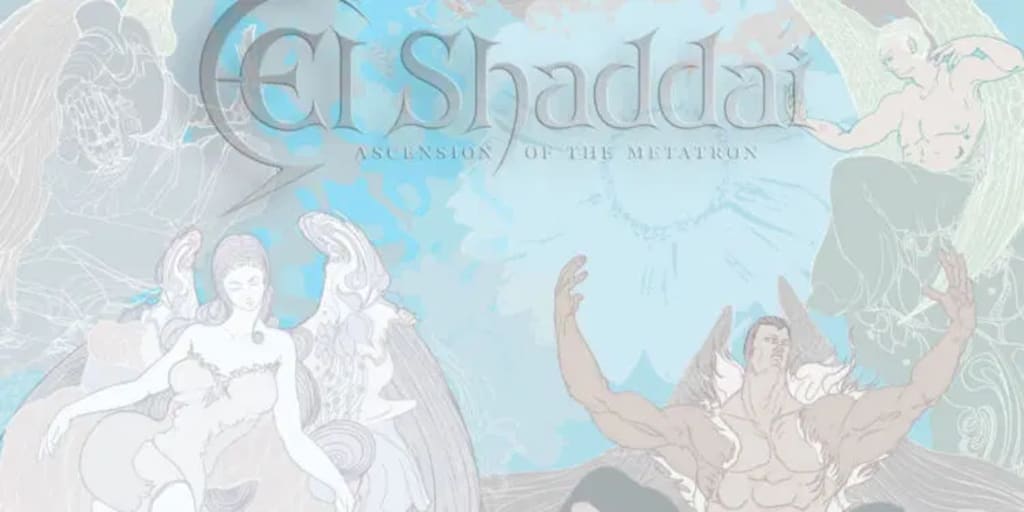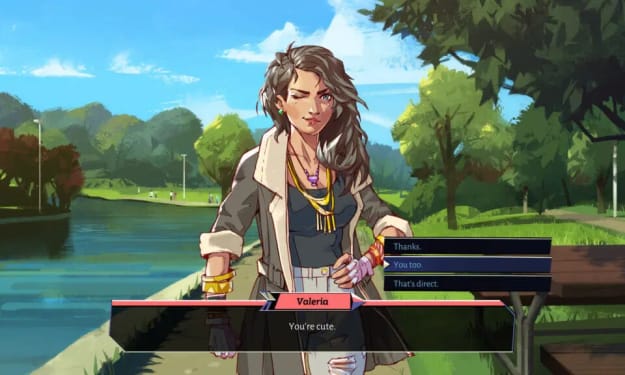El Shaddai Review
The first time I played El Shaddai : Ascension of the Metatron, I can still remember it

The first time I played El Shaddai : Ascension of the Metatron, I can still remember it. It was my 20s and I hadn't played anything quite like it since. Yes, it was a hack-and-slash adventure. It was also a mystical biblical tale that drew from Hebrew and Abrahamic traditions. It was dazzling in a way that I had never experienced before with video games. It wasn't "just a video game". El Shaddai felt like interactive art.
When I saw that the 10th anniversary re-release was coming out, I was eager to get it. It's been ten years since my last play, and I have seen a lot of changes in my gamer skills. I've played many more games, developed my favourite genres and been amazed by the possibilities of the medium of gaming. Despite my fond memories of El Shaddai being shattered by revising, I was thrilled to discover that the game still retains much of its charm ten years later.
The Book of Enoch
El Shaddai is based off the Book of Enoch. You are not the only one who is unfamiliar with this text. Enoch is the greatgrandfather of biblical Noah, and the Book of Enoch (an ancient Hebrew apocalyptic) is an ancient Hebrew text. The text discusses Nephilism, the origin of demons and fallen angels.
These texts were used as a foundation for the development team to create a fever dream. The role of Enoch is taken on by the players. In this game, Enoch is depicted as a long-haired bishounen, with a toned physique. God has asked Enoch go to Earth to find fallen angels and purify them. Lucifel, God's faithful sidekick and also serves as a saving point, is with Enoch.
These fallen angels live inside a tower. They have built surreal worlds in this tower that go against God's design for evolution. Enoch naturally visits the realms of fallen angels. Enoch runs through these worlds and picks up three weapons. He also fights baddies and tries to stop fallen angels.
Although it's an easy plot, at times it can feel a little mysterious. Because I was not sure if the references were Biblical, I found myself frequently going online to find out more. Different collectables hide the details of the plot, which allows players to delve as deeply as they wish (or not).
Trippy World
El Shaddai looks pretty. It is beautiful. Modern-gaming has made me dependent on my ability to control my camera. However, this game doesn't allow me to do that. The scenery must be appreciated by the players. Every angle feels like a perfectly captured mise-en-scene.
Each realm Enoch visits stands out because it reflects the wishes of the fallen angel that created it. The game feels genre-transcending in some ways because of the variety between levels. While you might be on one floor exploring a series organic, watery pools, the next floor feels more like a cute Mario clone.
However, each of these floors has an incredibly surreal quality. The worlds made by fallen angels were clearly not created by humans. They are created by the twisted desires and wills of the creatures who created them. Every floor is filled with this unarthly and uncomfortable beauty.
This juxtaposition is accompanied by a soundtrack. Some tracks feel more like video game BGM than others, but some tracks balance the beauty and unease of the Tower Enoch of ascending. Scarlet Liturgy is a track that plays at the start of the game. It blends menacing, synthy sounds with joyful, tribal music. As I walked through the area, I felt like there was something wrong. It set the perfect mood.
I have remained loyal to this aesthetic since ten years ago. It has held up 100%. Despite it seeming at odds, the combination between pretty-boys and personifications of angels works wonderfully together.
Hack-n-Slash
The game play in El Shaddai is not always a success. There are only a few attacks. You can only do a few moves at a time. The weapon switching mechanic is the real meat of this game. Enoch can purify and steal weapons from enemies as you battle them. There are three types of weapons: a fast melee weapon and a heavy melee gun. Knowing when to use which weapon is a huge part of El Shaddai.
This is fine, but not dynamic enough. But I doubt that many people are using hack-n-slash to make life-changing decisions. The controls weren't always very precise, which was my biggest problem. Sometimes I felt like I was being cheated or that my block wasn't working. The fighting was still enjoyable, despite this. Battles with low-level mobs felt lively and fast. Boss battles felt epic; every fallen angel felt distinct. These battles were difficult but easy to master, which made for a satisfying conclusion to each chapter.
The way damage is dealt with differs from one another. Enoch is able to take damage by letting a small piece of his armor fall off, until he can fit into a pair of jeans. There is no health bar. A "limit break" option is available, but it doesn't come with a gauge. Watch Enoch carefully and wait for his red glow. El Shaddai elevates the "game-y” aspects of the experience. Because I was not looking at my health bar, I paid attention to every detail. This was not something I liked during boss battles. After your first run, you will be able to customize your HUD.
Jump Puzzles
These aren't necessarily deal-breakers. The jump puzzles were my biggest problem. This game has a lot to do with jumping from one platform to another. It can sometimes feel frustrating. At first, I believed I wasn't skilled enough to play the game. My partner, who is a long-time platformer fan, helped me with one of the puzzles. He came to the same conclusion that I did: jumping didn't feel very precise. Some jumps felt extremely rage-inducing, especially when you consider that the camera angle has been set.
Is This Really a Feature?
El Shaddai's success is dependent on certain aspects. __S.86__ This is quite standard. I find it strange that the health gauge is locked behind completion.
Players can also find the "Prophesies of Ishtar" These texts provide clues to the story. These texts are hidden behind jump puzzles. You can die in the puzzle to trigger a "game over" cut scene. This was something I found very interesting, narratively. The second time it happened, however, I felt discouraged from collecting the Prophesies. I didn't want a long cut-scene to be shown just because I had died.
Both of these complaints are however nit-picky. These decisions are understandable. They emphasize narrative and visuals. They caught me completely off guard.
Last Thoughts
El Shaddaiisn't perfect, but it is exceptional. Beautiful visuals compliment the strange story. It was a hit in the 1990s, so I'm thrilled that it has been re-released. Some gameplay choices I didn't like. However, I was astonished at how few games tell stories on such a grand scale from ancient Hebrew texts. There are very few.
El Shaddai is a great game.





Comments
There are no comments for this story
Be the first to respond and start the conversation.